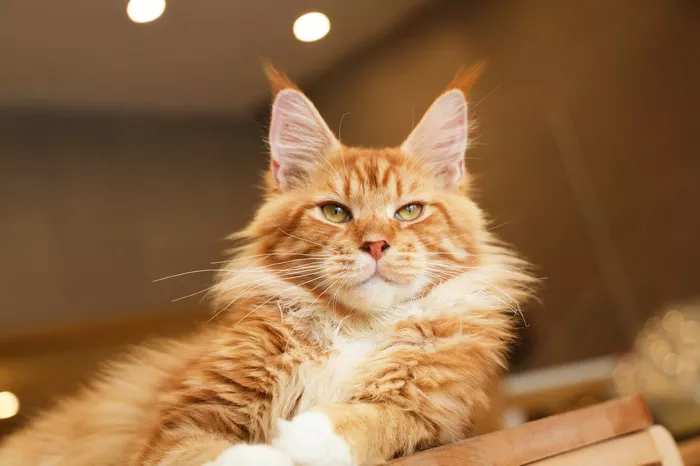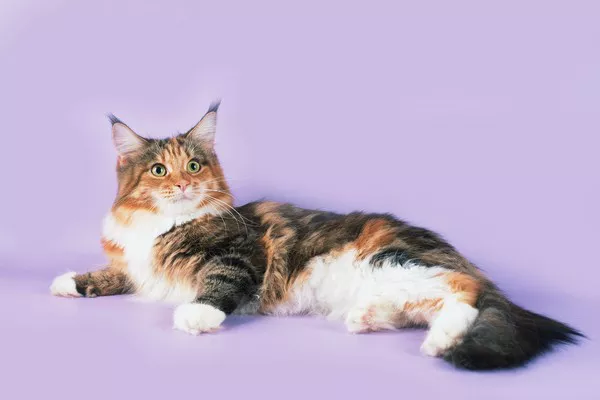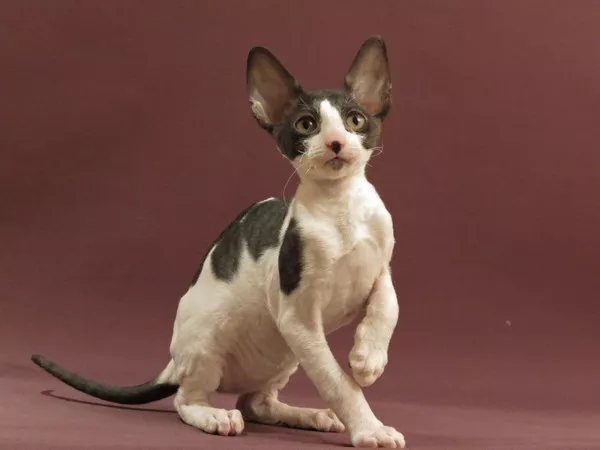Maine Coons are among the largest domesticated cat breeds, renowned for their majestic appearance, friendly disposition, and remarkable intelligence. Originating from North America, these cats have captivated pet owners worldwide. However, prospective owners often wonder if such a robust and active breed can adapt to being a house cat. In this comprehensive article, we will explore whether a Maine Coon can thrive as a house cat, examining their temperament, space requirements, exercise needs, grooming, diet, and overall care.
1. Understanding the Maine Coon’s Temperament
Maine Coons are celebrated for their friendly and sociable nature, earning them the nickname “gentle giants.” These cats are known to be affectionate, playful, and good-natured, traits that make them well-suited for life as house cats.
Affectionate and Social
Maine Coons typically form strong bonds with their human companions. They enjoy being part of family activities and are often described as “dog-like” due to their loyalty and social behavior. Unlike some breeds that may prefer solitude, Maine Coons thrive on interaction and are generally good with children, other cats, and even dogs. Their sociable nature makes them well-suited for indoor living, where they can receive ample attention and companionship.
Playful and Intelligent
These cats are highly intelligent and curious, traits that require mental stimulation to prevent boredom. Maine Coons enjoy interactive play, puzzle toys, and learning new tricks. Their playful nature can be channeled into indoor activities, making them adaptable to a house cat lifestyle, provided they are given enough stimulation and engagement.
2. Space Requirements and Environment
One of the primary concerns for potential Maine Coon owners is whether their home can accommodate such a large breed. While Maine Coons are sizable, their adaptability and easygoing nature mean they can thrive in various living situations, including apartments and smaller homes.
Space Considerations
Maine Coons do not necessarily require vast amounts of space, but they do appreciate having areas to explore and climb. Cat trees, shelves, and perches can provide vertical space that caters to their natural climbing instincts. Ensuring that your home has designated areas for these activities can help a Maine Coon feel more comfortable and entertained indoors.
Environmental Enrichment
To prevent boredom and behavioral issues, it is crucial to enrich the indoor environment. This can include providing scratching posts, interactive toys, and rotating different playthings to keep them engaged. Additionally, creating window perches allows Maine Coons to observe the outside world, which can be a source of stimulation and entertainment.
3. Exercise and Physical Activity
Maine Coons are active cats that require regular exercise to maintain their health and well-being. Indoor living does not preclude them from getting the physical activity they need, but owners must be proactive in ensuring they stay active.
Interactive Play
Engaging in daily play sessions is essential for a Maine Coon’s physical and mental health. Toys that mimic prey, such as feather wands and laser pointers, can stimulate their hunting instincts and provide vigorous exercise. Owners should aim for at least two to three interactive play sessions per day, each lasting around 15-20 minutes.
Cat Trees and Climbing Structures
Investing in sturdy cat trees and climbing structures can help Maine Coons expend energy and satisfy their climbing instincts. These structures also provide safe spaces for resting and observing their surroundings, contributing to their overall well-being.
Harness Training and Outdoor Exploration
Some Maine Coon owners opt for harness training to allow their cats to explore the outdoors safely. This can be a great way to provide additional stimulation and exercise. However, it is essential to ensure that the harness fits properly and that the cat is supervised at all times during outdoor excursions.
4. Grooming and Maintenance
Maine Coons have a distinctive long, shaggy coat that requires regular grooming to prevent matting and reduce shedding. Understanding their grooming needs is crucial for maintaining their health and appearance.
Regular Brushing
Maine Coons should be brushed at least two to three times a week to remove loose hair and prevent tangles. During shedding seasons, more frequent brushing may be necessary. Using a combination of grooming tools, such as slicker brushes, combs, and de-shedding tools, can help manage their coat effectively.
Bathing and Nail Trimming
While Maine Coons generally do not require frequent baths, occasional bathing can help keep their coat clean and reduce shedding. Nail trimming should be done regularly to prevent overgrowth and related issues. It is also beneficial to introduce Maine Coons to grooming routines from a young age to ensure they become accustomed to these practices.
Dental Care
Maintaining dental hygiene is important for preventing dental diseases. Regular brushing of teeth, providing dental treats, and scheduling professional dental cleanings can help keep a Maine Coon’s teeth and gums healthy.
5. Diet and Nutrition
Proper nutrition is vital for the health and longevity of Maine Coons. Given their large size and active nature, their dietary needs may differ from those of smaller cat breeds.
High-Quality Diet
Maine Coons benefit from a high-quality diet rich in protein and essential nutrients. Wet food can help maintain hydration, while dry food can support dental health. It is important to choose cat food formulated for large breeds and to consult with a veterinarian to determine the appropriate portion sizes and feeding schedule.
Monitoring Weight
Maine Coons can be prone to obesity if not monitored carefully. Regularly weighing your cat and adjusting their diet as needed can help maintain a healthy weight. Portion control and avoiding excessive treats are key components of managing their weight effectively.
Hydration
Ensuring that Maine Coons have access to fresh water at all times is crucial. Some cats prefer running water, so a pet water fountain can encourage them to drink more and stay hydrated.
6. Health Considerations
Maine Coons are generally healthy cats, but like all breeds, they can be predisposed to certain health conditions. Regular veterinary care and monitoring can help detect and address any health issues early.
Common Health Issues
Some health conditions that Maine Coons may be prone to include hypertrophic cardiomyopathy (HCM), hip dysplasia, and polycystic kidney disease (PKD). Regular veterinary check-ups, including cardiac screenings and hip evaluations, can help manage and monitor these conditions.
Preventive Care
Routine preventive care, such as vaccinations, flea and tick prevention, and dental check-ups, is essential for maintaining a Maine Coon’s health. Spaying or neutering is also recommended to prevent unwanted litters and reduce the risk of certain health issues.
7. Social Interaction and Mental Stimulation
Maine Coons are highly social and intelligent cats that require mental stimulation to prevent boredom and related behavioral issues. Ensuring they receive adequate social interaction is key to their happiness as house cats.
Human Interaction
Spending quality time with your Maine Coon is essential for their emotional well-being. Engaging in play, providing affection, and involving them in daily activities can strengthen the bond between you and your cat. Maine Coons often enjoy being near their owners and may follow them around the house, seeking attention and companionship.
Toys and Puzzles
Providing a variety of toys and puzzles can help keep a Maine Coon mentally stimulated. Puzzle feeders, interactive toys, and rotating their toy selection can prevent boredom and encourage cognitive engagement. These activities can also help mitigate potential behavioral issues arising from under-stimulation.
8. Adapting to Changes and New Environments
Maine Coons are generally adaptable cats, but they may require some time to adjust to changes and new environments. Understanding how to help them transition smoothly can ease the process and ensure their comfort.
Introducing New Pets
If you are introducing a Maine Coon to a home with existing pets, it is important to do so gradually. Providing separate spaces initially and slowly allowing supervised interactions can help prevent stress and ensure a harmonious relationship. Maine Coons are typically good with other animals, but each introduction should be managed carefully to accommodate individual personalities.
Moving to a New Home
When moving to a new home, it is important to create a safe and familiar space for your Maine Coon. Setting up a room with their favorite toys, bedding, and familiar scents can help them adjust to the new environment. Gradually allowing them to explore the new space at their own pace can reduce anxiety and help them feel secure.
Conclusion
In conclusion, Maine Coons can indeed be excellent house cats, provided their specific needs are met. Their friendly, social, and playful nature makes them well-suited for indoor living, where they can form strong bonds with their human companions. By understanding and addressing their requirements for space, exercise, grooming, diet, and mental stimulation, owners can create a fulfilling and comfortable environment for their Maine Coon.
Regular veterinary care, preventive measures, and thoughtful adaptation to changes are also crucial for ensuring their health and happiness. With proper care and attention, Maine Coons can thrive as house cats, bringing joy and companionship to their families. Whether you live in a spacious home or a cozy apartment, with the right preparations and commitment, a Maine Coon can become a beloved and well-adjusted member of your household.













![Do Birman Cats Like to Cuddle? [Revealed!]](https://www.catsmeowweb.com/wp-content/uploads/2023/06/burmese-cat-25.jpeg.webp)









